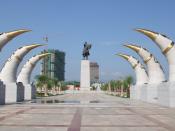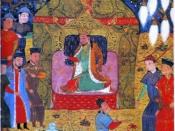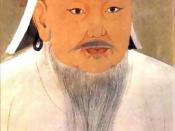The bubonic plague, the Hundred Years War, and the reign of Genghis Khan could be said to have changed the course of world history by prompting better working conditions and pay for the poor, ending the feudal system in Europe, and proposing tolerance for religion and equality for people, respectively.
The bubonic plague during the 14th century killed a third of Europe's population, causing great despair and pain, but it also contributed to advancement of technology and better working conditions for the poor. The disease is aggressive and spreads easily from person to person. It has long been thought to have originated in China, one of the world's busiest of the world's trading nations. The bacteria that causes the disease lives in the gut of fleas, which were transported on rats that inhabited trading ships traveling from China to Africa and Europe. A recent theory indicates that the plague may have originated in ancient Egypt.
Europeans were especially susceptible to the disease, because they lived in filthy, crowded conditions. Europeans, lacking refrigeration, often ate diseased meat. Medical knowledge was primitive, and victims often received bad advice, such as to refrain from bathing.
Death from the plague was painful, but fast. The first signs were aching limbs and vomiting blood. These symptoms were followed by swollen lymph nodes. The swelling continued for a few days until the lymph nodes burst. It was painful, and the victims' skin became mottled with spots that were initially red, then which turned black, giving the disease the nickname "Black Death."It has been theorized that the plague may have contributed to the Little Ice Age in the 1300s. The earth's atmospheric carbon dioxide sharply increased between 1200 and 1300, believed to have been caused by deforestation brought about by Europeans. After 1350, the pattern reversed,


